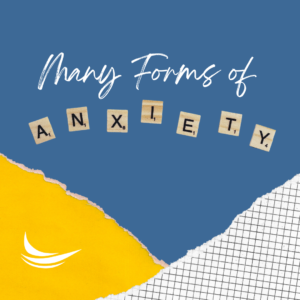 Anxiety comes in many forms, impacting people of all ages, background, and abilities. Did you know that anxiety disorders are the most common mental health concern in the United States?
Anxiety comes in many forms, impacting people of all ages, background, and abilities. Did you know that anxiety disorders are the most common mental health concern in the United States?
- Over 40 million adults in the U.S. (19.1%) have an anxiety disorder and approximately 7% of children (ages 3-17) struggle with anxiety.
- Since most people with anxiety tends to develop symptoms before age 21, increased awareness on the types of anxiety can be helpful.
Here is an overview of the many forms of anxiety-disorders:
Generalized Anxiety Disorder (GAD) involves excessive worries present over a period of six months about generalized or “everyday” life events. Content often includes a variety of topics such as work or school, relationships, finances, health, etc. Associated symptoms can include difficulties sleeping and concentration, fatigue, irritability, and muscle tension.
Panic attacks involve intense surges of fear along with intense discomfort. A wide variety of physical symptoms are present such as sweating, shaking, trembling, dizziness, shortness of breath, choking, nausea, and accelerated heart rate. Panic attacks can be present with a variety of anxiety-related disorders, especially those with a panic disorder. Individuals with panic disorder experience recurrent, unexpected attacks which is a source of anxiety.
Specific Fears/ Phobias include excessive or irrational fears to something that poses little danger or perceived threat. There may be fear related to specific objects, activities, situations, animals or people. Common phobias in the top 10 include:
- Fear of being in constricted, confined spaces (claustrophobia)
- Fears of certain animals such as snakes, spiders, bees, birds
- Fears of thunderstorms
- Fear of heights or flying
- Fear of medical procedures. This can include fears of blood, needles, and avoidance of certain procedures such as seeing a dentist.
- Fear of developing certain illness such as cancer. This may fall into the category of an illness-related anxiety disorder or sub-category of OCD.
Agoraphobia is also a type of phobia defined as “extreme or irrational fear of entering open or crowded places, of leaving one’s own home, or of being in places from which escape is difficult”. Anxious distress and avoidance of feared situations such as crowded spaces and public transportation is common in those with agoraphobia.
Separation Anxiety involves intense fears of separating from a parent, caretaker, or major attachment figure. Excessive worries related to the safety and well-being and fear of loss due to an untoward event such as illness, accidents, or traumatic event are often present. Separation anxiety is seen in childhood but may persist into adulthood.
Social Anxiety/ Social Phobia involved intense and persistent fears of being judged, humiliated or embarrassment in social situations. Those with social anxiety either avoid social situations or endure them with intense anxiety.
Selective Mutism is relatively rare but involves failure to speak in which there is an expectation to do so and not due to lack of knowledge or comfort with the language.
Anxiety is also commonly associated with significant life changes and other major categories of mental health such as neurodevelopmental-disorders, depression, eating disorders, obsessive-compulsive disorder (OCD),posttraumatic stress disorder (PTSD) and substance use.
It is important to note that not everyone who experiences anxiety has an anxiety disorder and that it is important to rule out medical causes since underlying health conditions can contribute to anxiety. Coordinating care with your medical doctor and a mental health professional is recommended to address both the physical and mental health symptoms of anxiety and formulate a customized treatment plan which may include a combination of therapy, medication, and lifestyle changes.
Written By: Charlotte Johnson, MA, LPCC
We’re Here to help
Our wellness experts will be happy to take care of you. You can CLICK HERE to schedule an appointment now or call (612)223-8898.
Meet Clinicians
We’re united by our commitment to providing effective, relevant, and innovative mental health support at all stages of your journey. Click Here to find out more about who we are, where we come from, and how we live out CARE’s mission every day.
The professionals at CARE are actively collecting and creating resources to help with what you need. We’re Here for You.



